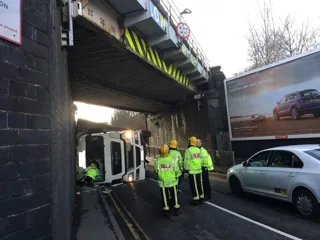A Government consultation of the function and role of traffic commissioners has recognised their importance but outlined a series of changes to make them more effective.
The eight traffic commissioners have responsibility in their individual regions or counties for the licensing and regulation of those who operate heavy goods vehicles, buses and coaches, and the registration of local bus services.
They are assisted in this work by 11 deputy traffic commissioners, who preside over a number of public inquiries.
The Department for Transport (DfT), which conducted the review from August to September 2021, says it wants to bring the eight tribunals together into one body, overhaul the fees paid by fleets and change the office’s name.
Transport minister Richard Holden acknowledged that traffic commissioners undertake an “important function” on behalf of the DfT.
Writing in the ministerial forward to the DfT’s review, he said: “They – and the individuals who support them – contribute directly to our strategic priorities; improving transport for the user by promoting the safe operation of heavy vehicles and buses on our roads and growing our economy by supporting transport operators to keep goods and passengers moving.
“I welcome the review’s finding that the traffic commissioner function generally operates effectively and can meet the standards of service for the transport industry.”
He also noted that responses to the consultation and interviews with the industry had showed broad support for the Office of the Traffic Commissioner (OTC) and the traffic commissioners.
“Industry has confidence in the work of traffic commissioners, who with the staff of the OTC played a key role in supporting the transport industry during the pandemic," he continued.
“They took decisive action to mitigate impacts on service delivery and adopted flexible, innovative practices to effectively support businesses during this very challenging period. I am grateful to all those involved.”
In the short-term, DfT will work with the traffic commissioners and the local transport policy forum, to define future priorities for the office.
It notes that this strategic vision, including how it aligns with other Government functions, will allow for meaningful consideration to be given to possible legislative reform as well as operational improvements. It will also increase policy alignment across the OTC, DfT and DVSA delivering better outcomes for service users.
Holden explained: “Legislative change will need to be carefully considered alongside other Government priorities, as Parliamentary time allows.
“In the meantime, much can be achieved through working collaboratively and making better use of the powers already provided in legislation. I look forward to working with the senior traffic commissioner (Richard Turfitt) in this regard.”
Over the longer-term, DfT says that the eight traffic commissioners should be consolidated into one independent tribunal body rather than sit as eight individual tribunals.
It argues that this will provide better governance structures, as well as tribunal rules.
"Removing eight individual and independent office holders makes managing the organisation less complex and removes duplication and an unnecessary complexity in reforming policies and processes," the DfT added.
"This change could be done without undermining the independence of TC (traffic commissioner) decision-making as is the case in other tribunals."
It also wants a president to replace the senior traffic commissioner role, to head-up the single tribunal body.
DfT says that this will allow for improvements to governance arrangements, as well as clarifying lines of accountability.
Furthermore, the review recommends that the fee structure be reformed in accordance with central guidance to help remove the current operating deficit.
DfT says that the OTC’s function should be fully funded through the fees it charges for the services provided, without making a profit and without requiring subsidy from elsewhere.
The fee structure, it adds, should adopt a graduated approach for operators in line with evidence from the consultation.
As part of the longer-term structural reforms of the office, consideration should also be given to whether its current name accurately reflects the organisation’s judicial functions, says the DfT.
Feedback from the public consultation suggested this could be much clearer.
Changing the name of the traffic commissioner function to better reflect what the role entails, it argues, should increase public understanding, as well as more clearly demonstrating its judicial nature.
Holden said that he wanted to commend the traffic commissioners, the staff in the OTC, and DVSA for the work already done to strengthen governance and better support traffic commissioners, as well as for the willingness to continue to upskill and improve outcomes for the industry and the public.
“My ambition is to ensure that a safe, fair, and reliable passenger and goods transport continues to thrive through the invaluable work of the traffic commissioners and DVSA who I commend for their dedicated work,” he concluded.























Login to comment
Comments
No comments have been made yet.